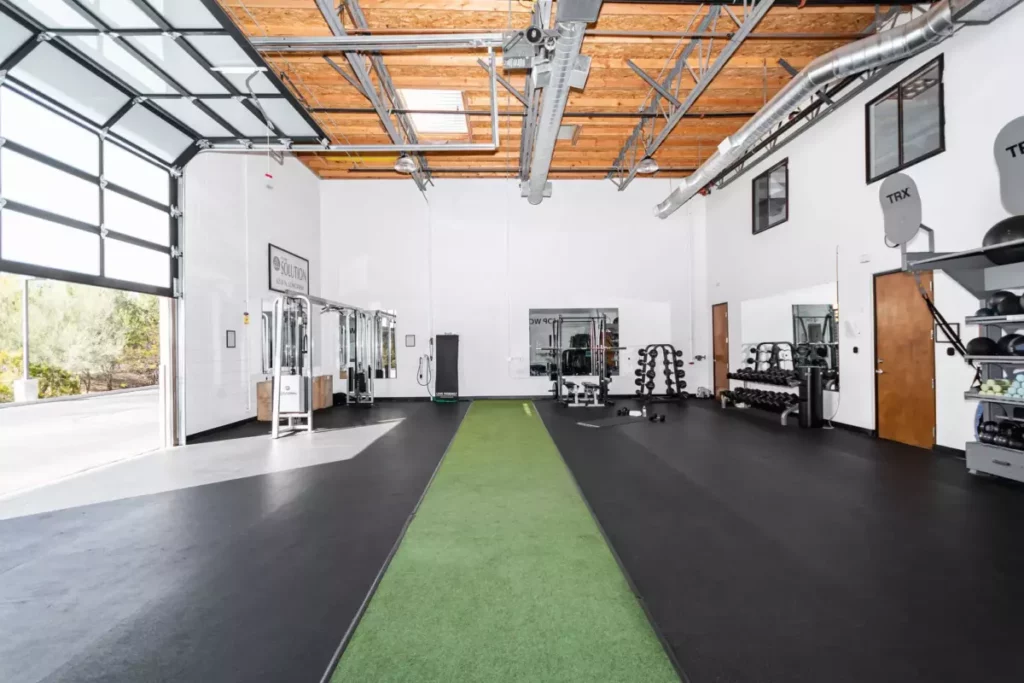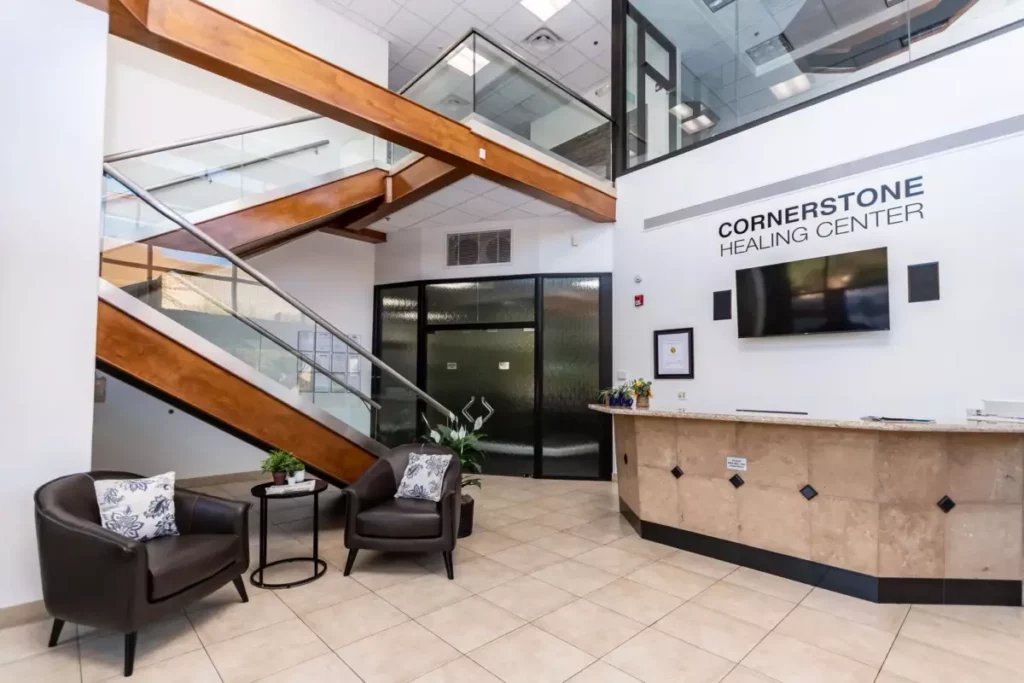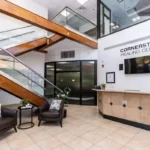Mood Disorder Treatment Programs
Living with mood disorders comes with a daily struggle to manage unpredictable swings in mood and energy. Find balance at Cornerstone.
Begin your insurance verification today

Living with Mood Disorders
At Cornerstone, we understand that living with a mood disorder can mean that there are times when activities seem laborious or impossible, while other times, you can feel restless and impulsive. It often feels like walking a tightrope while trying to manage the biological factors largely outside your control that amplify the highs and lows.
Treatment through a combination of medication, psychotherapy, and lifestyle changes, led by Cornerstone, can help you find balance in the chaos. With patience, courage, and support, those living with conditions like major depression, persistent depression, and bipolar disorder can maximize stability while coming to accept and work within their limitations. Hope comes from focusing not on a cure for the incurable but on discovering one’s resilience no matter the uncertainty that lies ahead.
Understanding Mood Disorders
What is a Mood Disorder?
Mood Disorders and Bipolar Disorder
Symptoms
Risk Factors
Diagnosing Mood Disorders
Mood Disorders are a category of mental health conditions characterized primarily by disruptions in emotional state and regulation. In other words, they occur when your state of mind does not match your life situation.
They are driven by chemical imbalances altering neurotransmitter activity in brain areas controlling things like pleasure, motivation, appetite, sleep, concentration, and energy level. The most prevalent subtype is major depressive disorder, featuring prolonged intense sadness, hopelessness, disinterest, fatigue, and suicidal thoughts.
Bipolar is classified as a mood disorder. Bipolar disorders involve alternating states between severe highs known as a mania with impulsivity, risk-taking, excitability, and little need for sleep, then extreme low periods.
Additional types include persistent depressive disorder with more chronic low-level symptoms and premenstrual dysphoric disorder tied to menstrual cycles.
While mood disorder episodes often require acute treatment for stabilization, these tend to be recurrent conditions managed through maintenance plans to prevent or minimize relapses long term due to underlying biological vulnerabilities.
Mood disorders often present as persistent depressive moods, manic episodes, and cyclical fluctuations, such as a clear and predictable up and down emotional cycle.
Some influential risk factors make certain individuals more prone to developing Mood Disorders. Genetics and family history play a major role, especially if depressive disorders or bipolar disorders run in your family.
Additionally, high levels of persistent stress, trauma, and major life crises also increase your risk of developing a mood disorder.
Hormonal changes tied to menstruation, pregnancy, postpartum, and perimenopause can serve as triggers, particularly for those already vulnerable.
Certain medications and substance abuse may worsen or bring about symptoms as well.
Getting an accurate diagnosis is the first step in securing effective treatment for Mood disturbances. Our mental health professionals assess complex, prolonged grief reactions for depth relative to cultural and social norms through interviews, questionnaires, and reviews of functioning levels across major life domains.
We utilize standardized scales and questionnaires help assess depression, mania, anxiety levels plus associated features like concentration issues or suicidal thinking.
We also identify coexisting conditions like major depression and post-traumatic stress that may require simultaneous treatment for comprehensive healing.
Our Mood Disorder Treatment Programs

Residential Programs
Our residential programs for grief provide around-the-clock care in a safe, supportive environment. With a mix of therapy, medication, and holistic approaches, this immersive program helps you address the core issues behind your mood disorder and develop lasting coping skills for long-term recovery.

Outpatient Programs
Our outpatient treatment for anxiety provides flexible, part-time care, enabling individuals to focus on recovery while keeping up with daily responsibilities. With therapy, medication management, and supportive services, we guide you through your symptoms and recovery journey.

Virtual IOP
Our Virtual Intensive Outpatient Program (IOP) for mood disorders offers comprehensive, convenient support from the comfort of home. With individual therapy, group counseling, and secure online resources, it’s a great option for those who need flexible care but want the full support of a structured program.

Cognitive Behavioral Therapy
Cognitive Behavioral Therapy is a highly effective treatment for mood disorders. It involves identifying and challenging negative thought patterns and behaviors to alter unwanted thoughts.

Medication Management
Medication management is often used in conjunction with therapy. Medications like anti-depressants and anti-anxiety drugs can help regulate brain chemistry and alleviate symptoms.

Holistic Therapies
We emphasize holistic therapies that address the mind, body, and spirit. This can include mindfulness practices, yoga, and nutritional counseling. These practices help you to manage emotions and reduce stress. By focusing on being present without judgment, you can gain tools to break free from grief, creating a strong foundation for recovery.






















Our Scottsdale Behavioral Health Center
Cornerstone has a Behavioral Health Center treatment located in Scottsdale that offers lifesaving mental health treatment services. The environment we create for you promotes healing and focus while also ensuring your comfort. We have group and learning rooms that provide space for collective therapy sessions and educational workshops.
We have individual therapy rooms that provide privacy and comfort for one-on-one sessions, allowing our clients to work with their therapists on resolving personal issues. You have access to a large fitness facility as well.
At Cornerstone Healing Center, we are committed to delivering a holistic approach to mental health treatment, blending comfort, therapy, and personal development for a full experience.
Benefits of Our Treatments for Mood Disorders
Our Arizona Behavioral Health Center is designed to provide a supportive and safe space so you can heal at your own pace.
Integrative Recovery Approach
Our integrative approach addresses the physical, mental, and emotional sides of recovery, with a deep understanding of your trauma and triggers. In a safe and caring environment, we help you uncover your path to healing.
Dedication Clinical Team
Our team of dedicated specialists provide personalized, evidence-based treatment for trauma. Through counseling, we offer a confidential space to explore the root causes of your trauma, empowering you to build resilience and confidence on your recovery journey.
Comprehensive Care
Our trauma treatment programs provide continuous, caring support tailored to your unique needs. We’re here to walk alongside you, creating a plan that truly resonates with where you are in life and where you want to go
Broad Treatment Options
With a variety of care levels, we’re able to support you. From intensive support to flexible options, our treatment programs are designed to meet you wherever you are in your journey to recovery.
What to Expect
- An assessment of your individual needs and goals to create a personalized addiction rehabilitation plan.
- A treatment plan for mental health or co-occurring (or dual diagnosis) behavioral health conditions.
- Evidence-based therapies include cognitive behavioral therapy, dialectical behavior therapy, and trauma-informed care.
- Holistic approaches include yoga, meditation, art therapy, and music therapy
- Nutrition counseling and physical fitness activities for overall health and wellness.
- Family involvement in the recovery process through Common Ground or family sessions.
- Aftercare planning that includes relapse prevention strategies for long-term success in sobriety.
Client Family Testimonial
Meet Our Arizona Treatment Team
Meet our experienced masters-level treatment professionals passionately dedicated to providing compassionate, expert care in our state-of-the-art rehabilitation facilities and recovery centers in Scottsdale, AZ and Phoenix, AZ.
Clinical Director of Scottsdale Program
Eboni Fields, MS LPC
Eboni Fields, MS LPC, is a seasoned Clinical Director who brings over a decade of experience in behavioral health and substance abuse. She is a licensed professional counselor with a Masters in Mental Health Counseling from Grand Canyon University.
More About EboniClinical Director of Phoenix Program
Nate Bush, LCSW
Nate began his recovery journey in 2010 and earned a Master's in Social Work from ASU. He’s been in the Behavioral Health field since 2013. Specializing in CBT, DBT, and grief, Nate is now the Clinical Director of our Phoenix program, underlined by his passion for helping others who struggled with substance abuse issues as he did.
More About NateWhen is inpatient or residential treatment appropriate for mood disorders?
We advise you to consider 24/7 residential or inpatient treatment for Mood Disorders when:
- Suicidal thoughts become strong enough that your safety is at risk
- Symptoms like hopelessness, rage, agitation or risky behaviors are escalating rapidly
- Self-care ability is lost completely due to extreme depressive fatigue or manic disorganization
- Work/School functioning is failing despite outpatient treatment efforts
- Medication adjustments and therapy have been unsuccessful preventing recurrence of severe manic or depressive episodes
- Coexisting substance abuse to relieve symptoms or psychotic symptoms emerge
- A safe, structured environment is needed temporarily to interrupt the Mood Disorder cycle so recovery skills can be established
Do you accept my insurance for your treatments?
Most likely, yes! Cornerstone accepts most major insurances. To be sure, you can fill out our commitment-free form to verify your coverage.
What is the difference between mood disorders and mood swings?
Mood swings refer to relatively brief and transient fluctuations in your emotions that most people experience occasionally in response to stressors or triggers in life. They usually pass within a few hours or a couple days at most.
Mood Disorders on the other hand involve more extreme, prolonged and disruptive periods of depressed or elevated Mood along with related changes in thinking and behaviors. Mood disorder episodes typically last for weeks or months if untreated and can be so severe as to significantly damage work/school functioning, relationships and quality of life.
How can I support a loved one with a mood disorder get treatment?
Here are some effective ways you can support a loved one who needs help getting into treatment for a Mood Disorder, like depression or bipolar:
- Review credible information on Mood Disorders and treatment
- Have an open, non judgmental conversation expressing concern and willingness to help
- If your loved one has difficulty acknowledging problems, share their actions that prompted worries without assigning blame.
- Start a list of local therapists and programs, highlighting positives like specialties and comfort factors.
- Check health insurance coverage for mental health services, out of pocket costs and possible financial aid.
- Encourage taking medications and psychotherapy consistently despite side effects or discomfort.
- Create a supportive home environment for treatment by learning triggers and respecting boundaries.
Let's begin the journey together
Frequently Asked Questions
Knowledge base
Mood Disorder Information
Get Started Now
Call and speak with one of our caring team members about help for you or a loved one.













